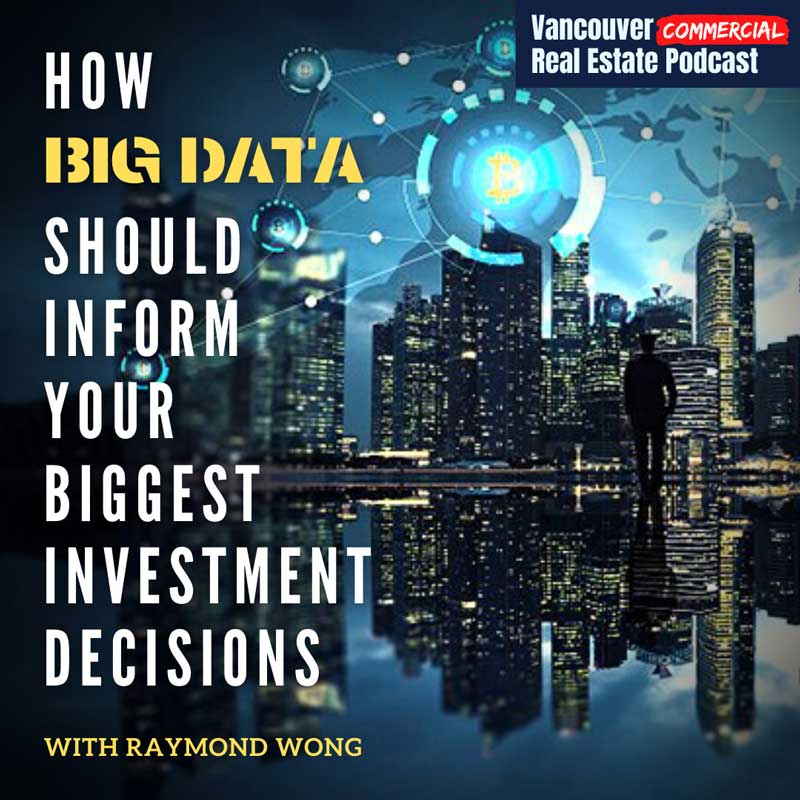
Powered by RedCircle
So many commercial real estate deals happen off the MLS, so where do investors go for detailed market data and what can it tell us? Raymond Wong, Vice President, Data Operations of Altus Group, sits down with Cory and Matt to discuss why Altus is a one-stop shop when it comes to data and research in the world of commercial real estate across Canada.
How does BC stack up against other commercial real estate markets across Canada? How have a number of the key BC commercial markets performed during the pandemic in relation to other markets? And what does the future look like across multiple BC markets and asset classes based on current trends? Knowledge is power as they say, so best to grab your notebook for this one!
Please tell us about yourself.
I’ve been in commercial real estate research for over 30 years and have looked at trends across Canada. I believe people can use data to help them make the best decisions and recognize risks and opportunities.
Altus Group is a global company focusing on real estate software. We look at how buildings compare to one another, valuation and market analysis. We help our clients reach their real estate objectives.
Can you tell us more about the difference between Altus and MLS?
We do work in conjunction with various real estate boards, looking at consumer trends and needs. We have the same drivers: interest rates, immigration, consumer confidence, etc. So they’re very similar, but we have different indicators, price points and data that we track. But the factors involved impact both commercial and residential trends.
Is there a public facing component of Altus?
You can access market trend reports and see what’s happening in the housing market on our website: www.altusgroup.com. If you want to go deeper, that requires a subscription.
How does BC stack up against other major markets?
We always compare Vancouver and Toronto – they’re the most recognized global markets for investors. Vancouver is second to Toronto in terms of investment activity. Vancouver went through the same thing every other market went through during the pandemic, especially in the office market. Availability went up. We also had people moving to the outer suburbs to get more space, especially if they were working from home.
Over the last few months, there’s been a return to the urban area. There’s been more downtown condominium activity in both Vancouver and Toronto. We have started to see a drop in sublet space in the office market in both Vancouver and Toronto too. But Vancouver saw a decrease in availability downtown – whereas Toronto saw an increase in availability. So Vancouver is actually doing better than Toronto in that aspect.
Places like Halifax have benefited from people relocating to get more space and bang for their buck. But Toronto and Vancouver have really increased their sales volume this year compared to last.
Can we talk more about office space?
The challenge in the office market is the uncertainty, which is reflected in the investment. Investment activity has dropped off in office but it’s increased in apartments. We haven’t seen prices drop for office. The current owners aren’t really in trouble so we’re not seeing a big discount. There hasn’t been a fire sale; it’s more of a flattening of prices. On the positive side, the office vacancy rate is stabilizing in both downtown Vancouver and in the suburbs – which hasn’t happened since pre-pandemic.
So the jury is still out on the office market. Will people re-enter the building? Do people feel safe getting on transit to get to work? People are coming back but many are driving, which is adding to the commute time. This explains why some people are moving downtown so they can walk to work.
Vancouver has had great activity, especially in the tech sector. Public transit is a big factor in getting people into the office and feeling safe. Do people living in the suburbs really want to go back to a 90 minute commute? What type of amenities are needed to bring people back into the office? You need to bring people back in for a purpose – like collaboration. People want to have the same level of convenience as they had working from home, like being able to order food on their laptop. So how do companies do that? I’m a big fan of the office, especially the downtown office.
What BC markets have experienced growth?
The growth we’re seeing is based on product availability. Industrial has been one of the hottest commercial sectors, so availability of land is key. We see that more in Burnaby and Surrey. Overall, if we look at investment volume compared to one year ago, Vancouver was at $4.3 billion and now is over $7 billion in investment. Anything that deals with excess land or a redevelopment play really works. Vancouver has always had the lowest cap rates for multi-family but the anticipated return for the asset makes those numbers work. So we’re seeing an increase in investment activity in Vancouver, Surrey and Richmond.
Victoria is another market that has done really well. Not just for their office demand, but for industrial, retail and overall investment activity. Kelowna has done well too, especially as people are looking for more bang for their buck.
It will be interesting to see if the year-end 2021 numbers exceed the 2019 investment numbers. We’ll blow 2020 away but it will be interesting to see if we beat the record, which was in 2019. And this is without office.
What is driving this market?
There’s a lot of capital out there looking for a home. It speaks to the overall confidence of investors. Foreign players are looking at Vancouver and Toronto, so there’s a big demand for real estate and the relative stability of Canada. I don’t think this is slowing down. It may come down a bit in 2022 due to a shortage of product, and because 2021 was a double-up year from 2020. But the overall confidence of investors isn’t going anywhere.
What is your take on large cities moving forward? Has covid changed your perspective?
I’m an urban planner so I love cities and how they evolve and change. The return of the condo market has been interesting. Just like we are seeing with retail, we’ll see an evolution in office space. We’ll see more wellness companies, co-working, options for companies to grow or shrink quickly, etc. Millennials and young workers still want a vibrant downtown and the ability to walk to work. I don’t think downtown is going away. But it will evolve as people’s needs change.
There’s a shortage of skilled workers. I believe having amenities, the office experience and the community culture will bring people back in. Again, I’m a strong believer in office and the urban area.
Have you seen some buyers who have shifted to buying outside of downtown and into the Fraser Valley?
Absolutely. Investors aren’t just looking at geography – it’s about product type as well. There’s an increased interest in public storage. Investors are looking to diversify and to grow down the road. So it’s no surprise that institutional investors are looking at outlying areas. I think we’ll see more of that.
If you were looking to buy one asset class in one location as an investment, where would you be looking and what would you be looking at?
I love industrial. Rents go up and down 10-20% and you don’t have that exposure in other asset classes. Right now availability is low and there’s redevelopment opportunities down the road, so there’s an increase in value. I like anything with excess land or potential redevelopment. Retail has been a big opportunity for many investors based on location and redevelopment options. I like industrial because of its stability and potential return. I believe in a medium to long-term hold and not an overnight flip.
What’s the best case forecast for Canadian real estate?
Industrial is going to do well for the next five years and beyond because of ecommerce. I think retail will find its footing. We won’t see our malls turning into giant fulfillment centres but there will be some changes. On the office side, it will improve slowly. In Vancouver there’s six million square feet of office space under construction downtown and in Toronto there’s nine million. That puts a lot of pressure on the older buildings with fewer amenities. Companies are still trying to figure out how much space they need. I do think the downtown will come back.
You can’t go wrong with apartments. They’ll keep doing well and even better when immigration comes back. We still have a housing shortage in Canada. In places like Vancouver, real estate will always attract attention. I don’t think we’ll see any major corrections in the next two to three years. I think it will be a gradual recovery. We also have inflationary concerns, a potential interest rate increase, supply chain issues, etc. So those other factors need to be considered. Overall, we’re doing okay. We have to wait and see how things pan out over the next 9-12 months.
What are the biggest risks facing the commercial real estate market in Canada?
Inflation may slow the economy down. The US economy, and the fourth wave of the pandemic and any resulting lockdowns are also concerns. Lumber prices were a big wildcard. Interest rates may be a concern. I’m paranoid by nature but there are a number of factors out there that could tip the scales for us. I’m optimistic but there is an aspect that causes me to lose sleep at night.
What advice do you have for our listeners about commercial real estate in Canada?
Build relationships. I started in this business 33 years ago and I’m still good friends with a lot of people I started with. The relationships and network around you make you a better person and better informed. It’s important to be able to make friends and establish strong relationships. That’s for other sectors, not just real estate. But real estate is a close knit community.
Find out more: altusgroup.com
For all the curious minds interested in commercial real estate investing, grab a coffee and pull up a chair because we have exclusive stories and tips from commercial real estate brokers, investors, developers, economists, urban planners, and everyone in-between. From the successes and failures to the motivations and lessons learned, the Vancouver Commercial Real Estate Podcast is your insight into commercial real estate in Vancouver, Victoria, Kelowna, and beyond.
What's the best real estate market to invest in? What are the commercial real estate asset classes and property types? Hosted by Cory Wright, founder of William Wright Commercial, and co-hosts Adam and Matt Scalena of the Vancouver Real Estate Podcast, our podcast opens the door to real estate investing for everyone from beginner investors to experienced real estate professionals. New episodes are released every Tuesday. Follow the Vancouver Commercial Real Estate Podcast on Apple Podcasts, Spotify, Google Podcasts, or your favourite streaming platforms.

This communication is not intended to cause or induce breach of an existing agency agreement. E&OE: All information contained herein is from sources deemed reliable, and have no reason to doubt its accuracy; however, no guarantee or responsibility is assumed thereof, and it shall not form any part of future contracts. Properties are submitted subject to errors and omissions and all information should be carefully verified. All measurements quoted herein are approximate.
ⓒ William Wright Commercial Real Estate Services 2024
Proudly designed by Burst Creative